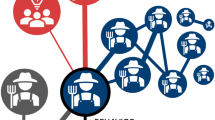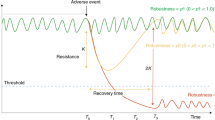Abstract
To cope effectively with the impacts of climate change, people will need to change existing practices or behaviours within existing social–ecological systems (adaptation) or enact more fundamental changes that can alter dominant social–ecological relationships and create new systems or futures (transformation). Here we use multilevel network modelling to examine how different domains of adaptive capacity—assets, flexibility, organization, learning, socio-cognitive constructs and agency—are related to adaptive and transformative actions. We find evidence consistent with an influence process in which aspects of social organization (exposure to others in social networks) encourage both adaptive and transformative actions among Papua New Guinean islanders experiencing climate change impacts. Adaptive and transformative actions are also related to social–ecological network structures between people and ecological resources that enable learning and the internalization of ecological feedbacks. Agency is also key, yet we show that while perceived power may encourage adaptations, it may discourage more transformative actions.
This is a preview of subscription content, access via your institution
Access options
Access Nature and 54 other Nature Portfolio journals
Get Nature+, our best-value online-access subscription
$29.99 / 30 days
cancel any time
Subscribe to this journal
Receive 12 print issues and online access
$209.00 per year
only $17.42 per issue
Buy this article
- Purchase on Springer Link
- Instant access to full article PDF
Prices may be subject to local taxes which are calculated during checkout



Similar content being viewed by others
Data availability
Summary data that support the findings of this study are available within the paper and its Supplementary Information file. Raw ecological network data have been deposited in the Tropical Data Hub and can be accessed at https://doi.org/10.25903/5ecf39990a0bb. Raw social and social network data are available on request from the corresponding author with reasonable restrictions, as these data contain information that could compromise research participant privacy and consent.
References
IPCC Climate Change 2014: Synthesis Report (eds Core Writing Team, Pachauri, R. K. & Meyer, L. A) (IPCC, 2014).
Adger, W. N., Huq, S., Brown, K., Conway, D. & Hulme, M. Adaptation to climate change in the developing world. Prog. Dev. Stud. 3, 179–195 (2003).
Smit, B. & Wandel, J. Adaptation, adaptive capacity and vulnerability. Glob. Environ. Change 16, 282–292 (2006).
Yohe, G. & Tol, R. S. J. Indicators for social and economic coping capacity—moving toward a working definition of adaptive capacity. Glob. Environ. Change 12, 25–40 (2002).
Cinner, J. E. & Barnes, M. L. Social dimensions of resilience in social-ecological systems. One Earth 1, 51–56 (2019).
Cinner, J. E. et al. Building adaptive capacity to climate change in tropical coastal communities. Nat. Clim. Change 8, 117–123 (2018).
Mortreux, C. & Barnett, J. Adaptive capacity: exploring the research frontier. Wiley Interdiscip. Rev.: Clim. Change 8, e467 (2017).
Clayton, S. et al. Psychological research and global climate change. Nat. Clim. Change 5, 640–646 (2015).
Cinner, J. E. et al. Changes in adaptive capacity of Kenyan fishing communities. Nat. Clim. Change 5, 872–876 (2015).
Avelino, F. & Rotmans, J. Power in transition: an interdisciplinary framework to study power in relation to structural change. Eur. J. Soc. Theory 12, 543–569 (2009).
Brown, K. & Westaway, E. Agency, capacity, and resilience to environmental change: lessons from human development, well-being, and disasters. Annu. Rev. Environ. Resour. 36, 321–342 (2011).
Grothmann, T. & Patt, A. Adaptive capacity and human cognition: the process of individual adaptation to climate change. Glob. Environ. Change 15, 199–213 (2005).
Gow, K. M., Pritchard, F. & Chant, D. How close do you have to be to learn the lesson? Fire burns! Australas. J. Disaster Trauma Stud. 2, 1–9 (2008).
Adger, W. Social capital, collective action and adaptation to climate change. Econ. Geogr. 79, 387–404 (2003).
Barnes, M. et al. The social structural foundations of adaptation and transformation in social–ecological systems. Ecol. Soc. 22, 16 (2017).
Pretty, J. Social capital and the collective management of resources. Science 302, 1912–1914 (2003).
Tsai, W. & Ghoshal, S. Social capital and value creation: the role of intrafirm networks. Acad. Manage. J. 41, 464–476 (1998).
Nahapiet, J. & Ghoshal, S. Social capital, intellectual capital, and the organizational advantage. Acad. Manage. Rev. 23, 242–266 (1998).
Alpízar, F., Del Carpio, M. B., Ferraro, P. J. & Meiselman, B. S. The impacts of a capacity-building workshop in a randomized adaptation project. Nat. Clim. Change 9, 587–591 (2019).
Park, S. et al. Informing adaptation responses to climate change through theories of transformation. Glob. Environ. Change 22, 115–126 (2012).
Feola, G. Societal transformation in response to global environmental change: a review of emerging concepts. Ambio 44, 376–390 (2015).
O’Brien, K. Global environmental change II: from adaptation to deliberate transformation. Prog. Hum. Geogr. 36, 667–676 (2012).
Kates, R. W., Travis, W. R. & Wilbanks, T. J. Transformational adaptation when incremental adaptations to climate change are insufficient. Proc. Natl Acad. Sci. USA 109, 7156–7161 (2012).
Dowd, A.-M. et al. The role of networks in transforming Australian agriculture. Nat. Clim. Change 4, 558–563 (2014).
Blythe, J. et al. The dark side of transformation: latent risks in contemporary sustainability discourse. Antipode 50, 1206–1223 (2018).
Mimura, N. et al. in Climate Change 2007: Impacts, Adaptation and Vulnerability (eds Parry, M. L. et al.) 687–716 (Cambridge Univ. Press, 2007).
Hughes, T. P. et al. Climate change, human impacts, and the resilience of coral reefs. Science 301, 929–933 (2003).
Daraganova, G. & Robins, G. in Exponential Random Graph Models for Social Networks: Theory, Methods, and Applications (eds Lusher, D. et al.) 102–114 (Cambridge Univ. Press, 2013).
McPherson, M., Smith-Lovin, L. & Cook, J. M. Birds of a feather: Homophily in social networks. Annu. Rev. Sociol. 27, 415–444 (2001).
Axelrod, R. The dissemination of culture: a model with local convergence and global polarization. J. Conflict Resolut. 41, 203–226 (1997).
Klemm, K., Eguı́luz, V. M., Toral, R. & San Miguel, M. Globalization, polarization and cultural drift. J. Econ. Dyn. Control 29, 321–334 (2005).
Centola, D., Gonzalez-Avella, J. C., Eguiluz, V. M. & San Miguel, M. Homophily, cultural drift, and the co-evolution of cultural groups. J. Conflict Resolut. 51, 905–929 (2007).
Paluck, E. L., Shepherd, H. & Aronow, P. M. Changing climates of conflict: a social network experiment in 56 schools. Proc. Natl Acad. Sci. USA 113, 566–571 (2016).
Reed, M. et al. What is social learning? Ecol. Soc. 15, r1 (2010).
Bodin, Ö., Crona, B., Thyresson, M., Golz, A.-L. & Tengo, M. Conservation success as a function of good alignment of social and ecological structures and processes. Conserv. Biol. 28, 1371–1379 (2014).
Johannes, R. E. Traditional Ecological Knowledge: A Collection of Essays (IUCN, 1989).
Lemos, M. C. Drought, Governance and Adaptive Capacity in North East Brazil: A Case Study of Ceará Human Development Occasional Papers (1992–2007) (UNDP, 2007).
Bodin, Ö. et al. Improving network approaches to the study of complex social–ecological interdependencies. Nat. Sustain. 2, 551–559 (2019).
Borgatti, S. P., Jones, C. & Everett, M. G. Network measures of social capital. Connections 21, 27–36 (1998).
Marsden, P. V. & Friedkin, N. E. Network studies of social influence. Sociol. Methods Res. 22, 127–151 (1993).
Barnes, M. L. et al. Social-ecological alignment and ecological conditions in coral reefs. Nat. Commun. 10, 2039 (2019).
Bodin, Ö. Collaborative environmental governance: achieving collective action in social-ecological systems. Science 357, eaan1114 (2017).
Mcleod, E. et al. Lessons from the Pacific Islands: adapting to climate change by supporting social and ecological resilience. Front. Mar. Sci. 6, 289 (2019).
Froese, R. & Pauly, D. FishBase www.fishbase.org (2019).
Carter, M. R. & Barrett, C. B. The economics of poverty traps and persistent poverty: an asset-based approach. J. Dev. Stud. 42, 178–199 (2006).
Pollnac, R. B. & Carmo, F. Attitudes toward cooperation among small-scale fishermen and farmers in the Azores. Anthropol. Q. 53, 12–19 (1980).
Deressa, T. T., Hassan, R. M., Ringler, C., Alemu, T. & Yesuf, M. Determinants of farmers’ choice of adaptation methods to climate change in the Nile Basin of Ethiopia. Glob. Environ. Change 19, 248–255 (2009).
Below, T. B. et al. Can farmers’ adaptation to climate change be explained by socio-economic household-level variables? Glob. Environ. Change 22, 223–235 (2012).
De Jalón, S. G., Silvestri, S., Granados, A. & Iglesias, A. Behavioural barriers in response to climate change in agricultural communities: an example from Kenya. Reg. Environ. Change 15, 851–865 (2015).
Rogers Everett, M. Diffusion of Innovations 4th edn (The Free Press, 1995).
Fazey, I. et al. Adaptive capacity and learning to learn as leverage for social–ecological resilience. Front. Ecol. Environ. 5, 375–380 (2007).
Lutz, W., Muttarak, R. & Striessnig, E. Universal education is key to enhanced climate adaptation. Science 346, 1061–1062 (2014).
Grothmann, T. & Reusswig, F. People at risk of flooding: why some residents take precautionary action while others do not. Nat. Hazards 38, 101–120 (2006).
Klein, W. M. Objective standards are not enough: affective, self-evaluative, and behavioral responses to social comparison information. J. Pers. Soc. Psychol. 72, 763 (1997).
Reser, J. P. & Swim, J. K. Adapting to and coping with the threat and impacts of climate change. Am. Psychol. 66, 277–289 (2011).
Pelling, M., O’Brien, K. & Matyas, D. Adaptation and transformation. Climatic Change 133, 113–127 (2015).
Snijders, T. A. Markov chain Monte Carlo estimation of exponential random graph models. J. Soc. Struct. 3, 1–40 (2002).
Wang, P., Robins, G., Pattison, P. & Koskinen, J. MPNet: Program for the Simulation and Estimation of (p*) Exponential Random Graph Models for Multilevel Networks (Univ. of Melbourne, 2014).
Daraganova, G. & Pattison, P. in Exponential Random Graph Models for Social Networks: Theory, Methods and Applications (eds Lusher, D. et al.) 237–247 (Cambridge Univ. Press, 2013).
Kashima, Y., Wilson, S., Lusher, D., Pearson, L. J. & Pearson, C. The acquisition of perceived descriptive norms as social category learning in social networks. Soc. Netw. 35, 711–719 (2013).
Koskinen, J. & Snijders, T. A. in Exponential Random Graph Models for Social Networks: Theory, Methods and Applications (eds Lusher, D. et al.) 141–166 (Cambridge Univ. Press, 2013).
Acknowledgements
This project was supported by the Australian Research Council through a Discovery Early Career Fellowship Grant to M.L.B. (grant no. DE190101583), the ARC Centre of Excellence for Coral Reef Studies and the U.S. National Science Foundation (award no. 1620416). J.E.C is supported by the Australian Research Council (grant nos. CE140100020 and FT160100047) and the CGAIR Research Program on Fish Agri-Food Systems (FISH) led by WorldFish. We thank Ö. Bodin for helpful comments on an earlier draft, the Nature Conservancy for providing access to internal reports on activities associated with atoll farming in our study location, E. Shum for help with data processing and all of the individuals who participated in this project.
Author information
Authors and Affiliations
Contributions
M.L.B. designed the research. M.L.B., J.E.C., N.A.J.G., J.L. and J.Z.-M. performed the research. M.L.B. and P.W analysed data. M.L.B., P.W., J.E.C., N.A.J.G., A.M.G., L.J., J.L., S.R.S. and J.Z.-M. wrote the paper.
Corresponding author
Ethics declarations
Competing interests
The authors declare no competing interests.
Additional information
Peer review information Nature Climate Change thanks Kenneth Frank, Patrick Nunn and the other, anonymous, reviewer(s) for their contribution to the peer review of this work.
Publisher’s note Springer Nature remains neutral with regard to jurisdictional claims in published maps and institutional affiliations.
Supplementary information
Supplementary Information
Supplementary methods, Fig. 1, Tables 1–5 and references.
Rights and permissions
About this article
Cite this article
Barnes, M.L., Wang, P., Cinner, J.E. et al. Social determinants of adaptive and transformative responses to climate change. Nat. Clim. Chang. 10, 823–828 (2020). https://doi.org/10.1038/s41558-020-0871-4
Received:
Accepted:
Published:
Issue Date:
DOI: https://doi.org/10.1038/s41558-020-0871-4
This article is cited by
-
Building stewardship capacity through fishers’ knowledge and advocacy in fisheries management: a case study from Southeast Alaska
Maritime Studies (2024)
-
Trust in government and flood preparedness among households in developing countries’ megacities: the case of Jakarta, Indonesia
Environment, Development and Sustainability (2024)
-
Principles for transformative ocean governance
Nature Sustainability (2023)
-
Exploring the impact mechanism of low-carbon multivariate coupling system in Chinese typical cities based on machine learning
Scientific Reports (2023)
-
Exploring the Relationship Between Fishing Actors and Network Prominence in information-sharing Networks in Jamaican small-scale Fisheries
Human Ecology (2023)



